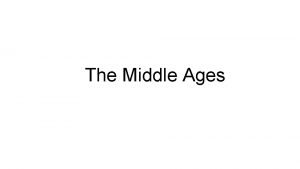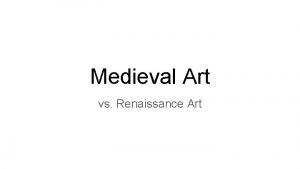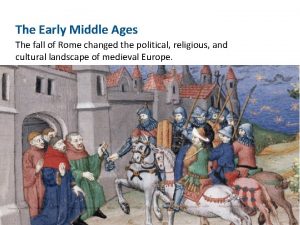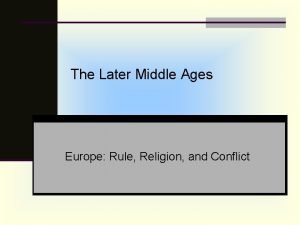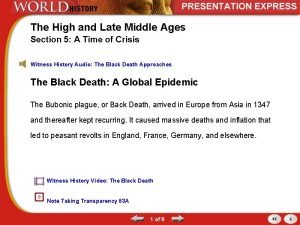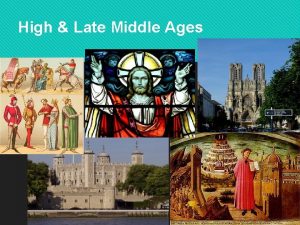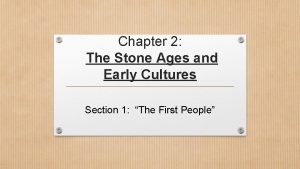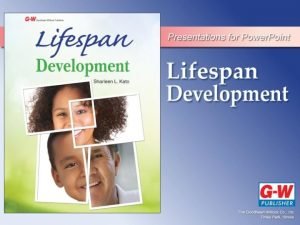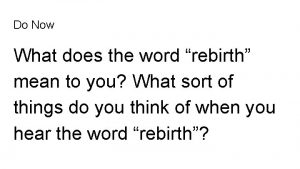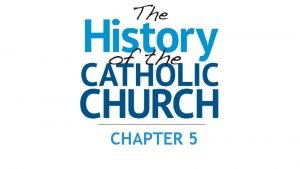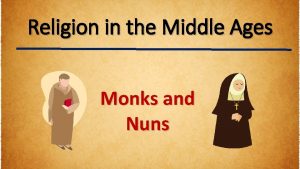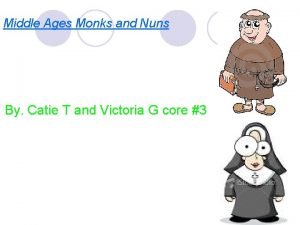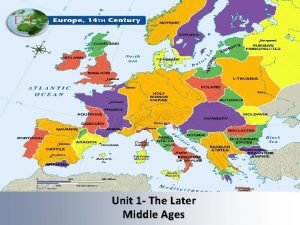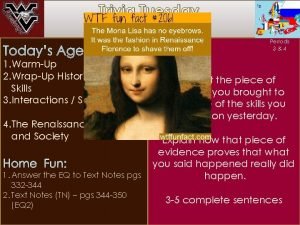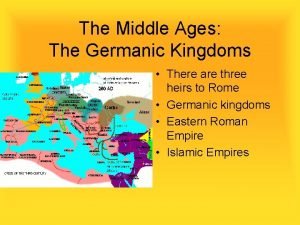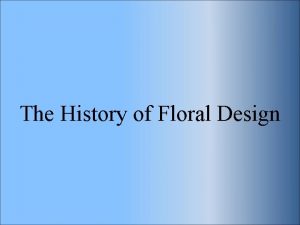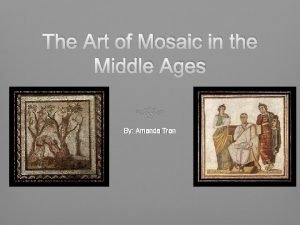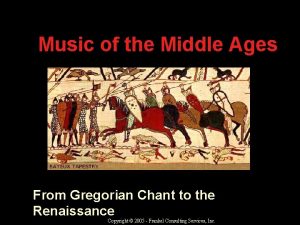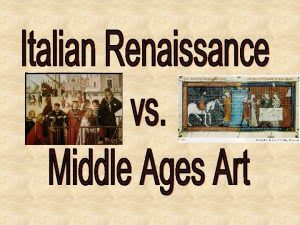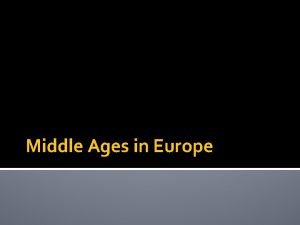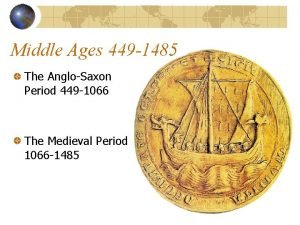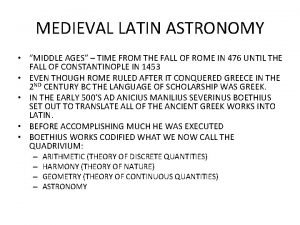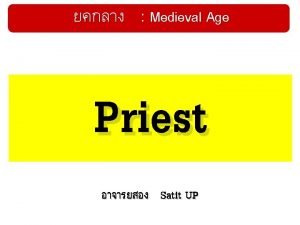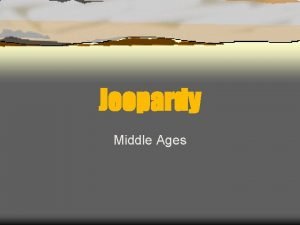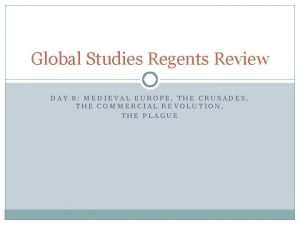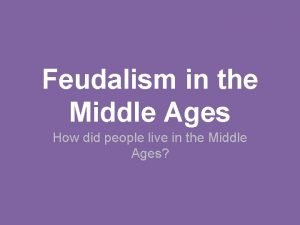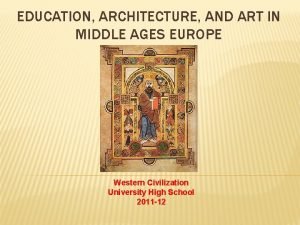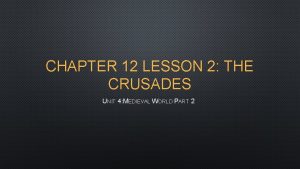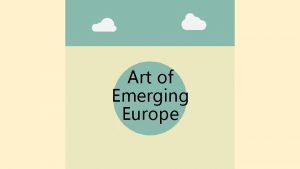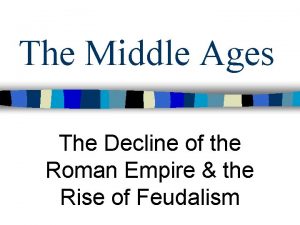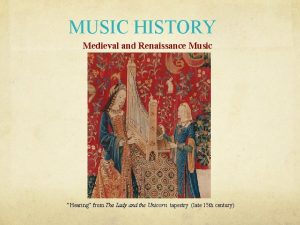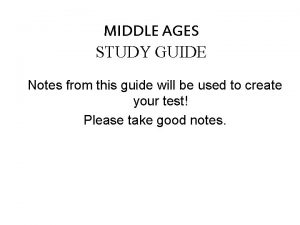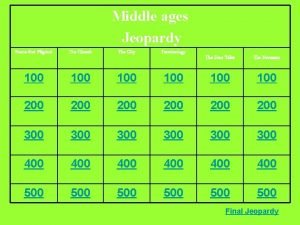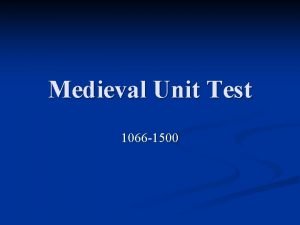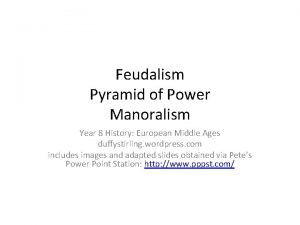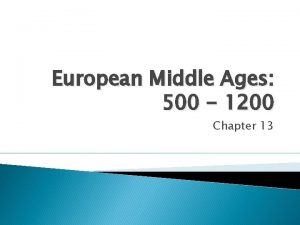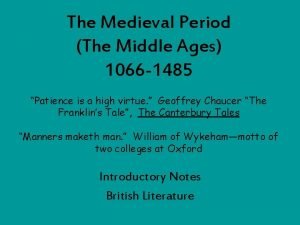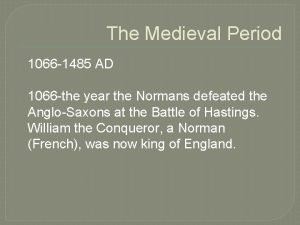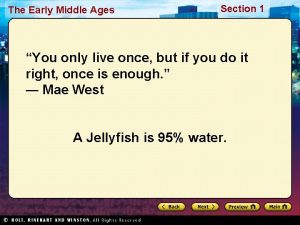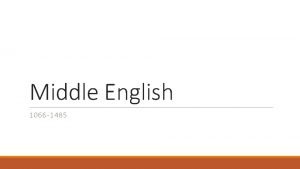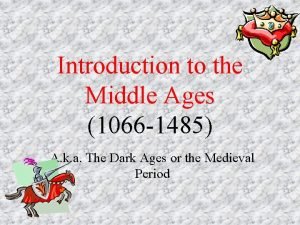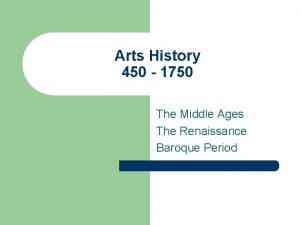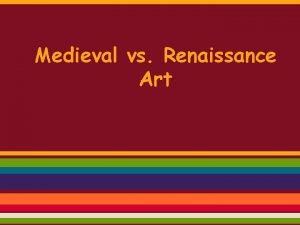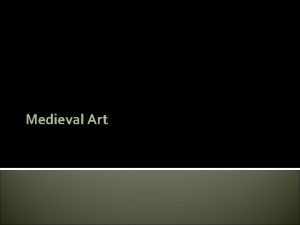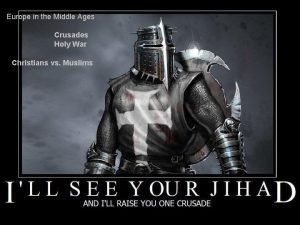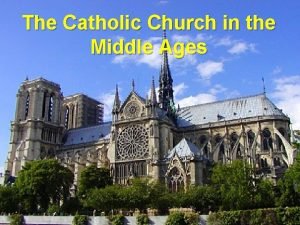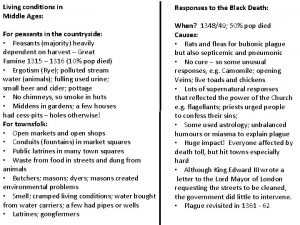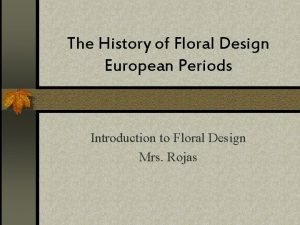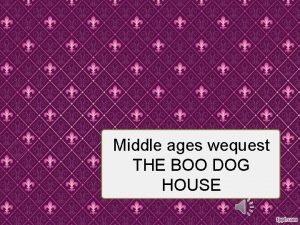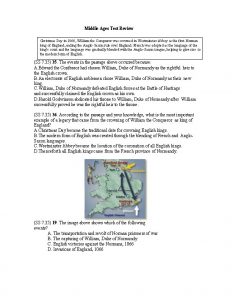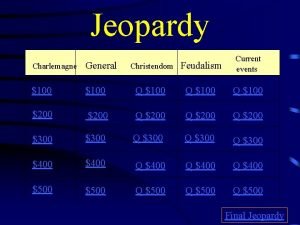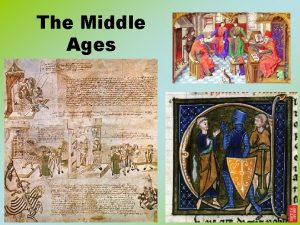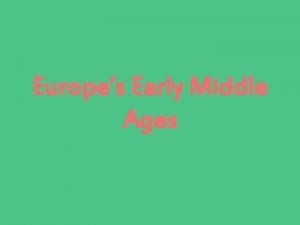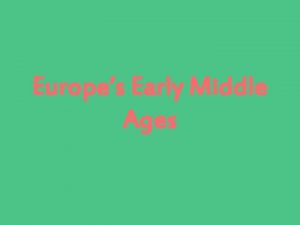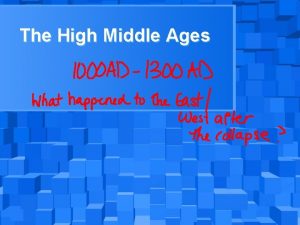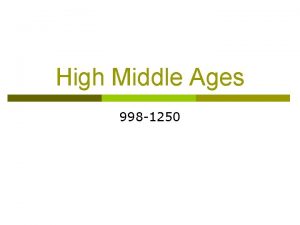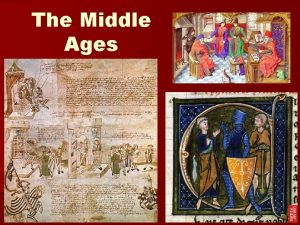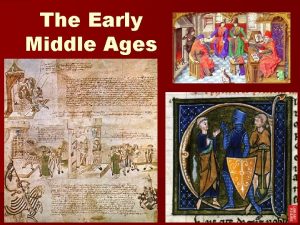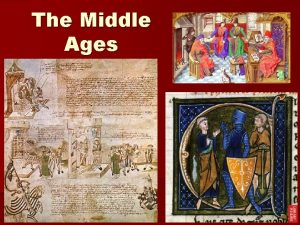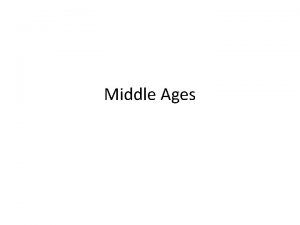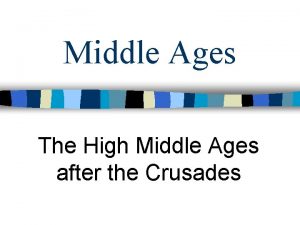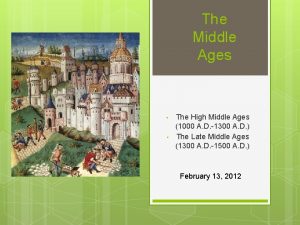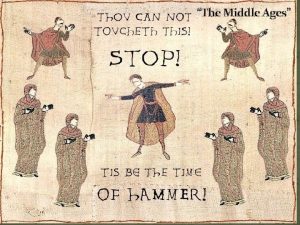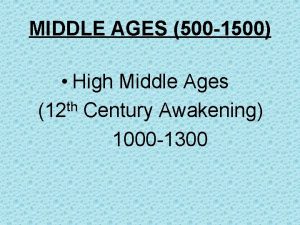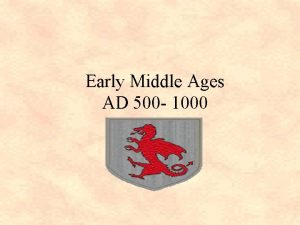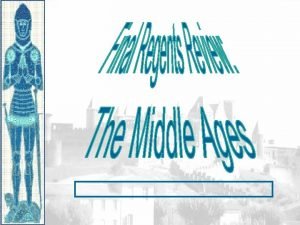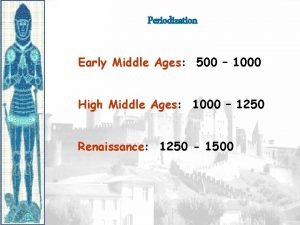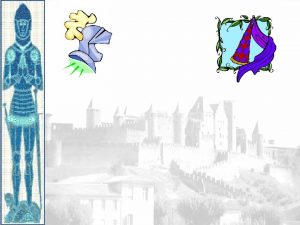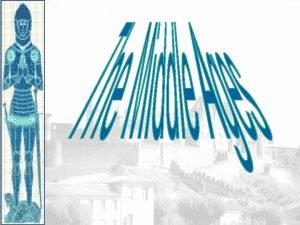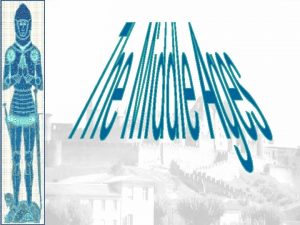The Early and High Middle Ages Middle Ages




























































- Slides: 60

The Early and High Middle Ages

Middle Ages UEarly Middle Ages U 5 th to 10 th centuries UDark Ages UPeriod of disorder and decline UHigh Middle Ages U 11 th to 14 th centuries UAdvanced toward higher level of civilization

Dark Ages UGermanic invasions helped bring decline of civilization UTrade & industry UMerchants feared robbers and pirates URoman roads deteriorated UUnemployed to rural areas ULearning & culture UConcerned with staying alive UDestroyed Roman places of learning

Dark Ages UDecline of strong central gov’t. UGermanic kingdoms weak URulers generally failed to provide protection, justice and order UGerman kingdoms lacked: UPower to control large territories UInfrastructure URules of succession to throne

Roman Catholic Church UMost powerful institution in medieval western Europe UModeled after Rome’s government UPope--supreme leader UCardinals--chief advisors UBishops--head religious districts UPriests--direct local communities

RCC’s Religious Role UTaught: UImportance of sacraments UFaith, good works, and church membership for salvation UUsed excommunication against those who violated Church laws UHeld inquisitions to uncover heretics

RCC’s Economic Role UMonks farmed UConsiderable income from its: ULands (30% of western Europe) UGifts (especially through oblation) UTaxes (10% tithe) UProhibited usury

RCC’s Cultural Role UPromoted learning by maintaining schools UCopied ancient books and manuscripts, preserving classical culture

RCC’s Political Role UGoverned Papal States in Italy UDeveloped canon law based on Roman law UHad its own courts UClaimed supremacy over civil government

Frankish Kingdom UClovis created powerful kingdom (5 th century) USubdued other Germanic tribes Gaul UConverted Franks Catholic Christianity, gaining support of: UPope UGaul’s large Christian population in to

Frankish Kingdom UMerovingian dynasty UHis incompetent descendants ruled for more than 200 years U“Do-Nothing” Kings UPower passed to powerful noble, “Mayor of the Palace”

Frankish Kingdom UCarolingian dynasty UCharles Martel UDefeated Moors at Tours (732) UPepin UAt father’s death, Mayor of the Palace URemoved last Nothing King became UCharlemagne got throne in 768 Do-

Charlemagne U 768 -814 UIncreased power of Catholic Church UEnded Lombard threat to Papal States UConverted pagan peoples to Catholicism

Charlemagne UEmpire= most of western Europe

Charlemagne UEmperor of the Romans (800) UCrowned by Pope Leo III in Rome UGovernment UEmpire divided into provinces UEach ruled by noble UMonitored by missi dominici UTemporarily halted shift of power from central government to nobles

Education under Charlemagne UCharlemagne valued education UEstablished schools in monasteries and cathedrals UEncouraged collecting and copying of Latin manuscripts

Education under Charlemagne UCreated Carolingian miniscule (small letters)

Breakup of Charlemagne’s Empire UTreaty of Verdun divided empire among 3 grandsons ULouis UEastern/modern Germany UCharles UWestern/modern France ULothar UCentral/modern Italy

Differed from Roman Empire URome UCentered around Mediterranean UEndured many centuries UCharlemagne UEncompassed mainly central and western Europe UCrumbled at Charlemagne’s death

New Invasions (9 th-11 th centuries) UVikings to coastal/ river cities


New Invasions (9 th-11 th centuries) UMagyars from Asia to Hungary to Western Europe UArabs to Southern France/Italy

New Invasions (9 th-11 th centuries) UNormans invaded Britain from France ULed to development of new relationship. . . feudalism

Why Feudalism? UAttacks from outsiders UWeakness of central governments UGerman rulers gave landed estates to important nobles in return for military assistance

Feudalism Defined USocial system URigid class distinctions UStatic (unchanging) way of life UPolitical system ULocal government ULocal military defense UEconomic system USelf-sufficient agricultural manors

Feudal Society UDetermined by birth, not work UFeudal social pyramid UKing UNominally owned all land UControlled only his estates UPowerful lords UGot fiefs from king UPledged military service

Feudal Society UFeudal social pyramid (cont’d) ULesser lords UGot fiefs from powerful lord UPledged military service UKnights UMost numerous nobles USerfs--peasants

Feudal Society ULords could receive lands from several lords leading to questions of primary allegiance UObligations between lord/vassal or noble/serf were hereditary UNoble’s title and property could only be inherited by first-born son (primogeniture)

Feudal Government UWeak Central Government UKing theoretically administered entire kingdom UActually did not have authority beyond his own lands UHe was only one of several powerful lords

Feudal Government UVigorous local government UNobles controlled their lands UThey: UMade laws ULevied taxes UDispensed justice UWaged war


Feudal Economy USelf-sufficient agricultural manor USerfs bound to land ULow agricultural output USerfs given scattered strips of land UWooden plows and crude sickles UThree-field system

Feudal Economy UDisappearance of trade UManors became more self-sufficient UCommerce unsafe UHeavy taxes imposed by nobles on goods transported across their domains



Civil/Religious Struggles UOn basis of 2 crownings, RCC asserted that popes may dethrone and crown emperors UPope Leo III crowned Charlemagne “Emperor of the Romans” in 800 UUpon his death title was unused UPope John XII crowned Otto I emperor in 962, beginning Holy Roman Empire



Civil/Religious Struggles UCivil rulers and popes claimed right to appoint RCC officials URulers gave fiefs to RCC officials UPopes gave religious authority UConcordat of Worms (1122): UPopes appoint Church officials URulers could continue to give fiefs (allowing them to have some say over selections)

Civil/Religious Struggles UArchbishop of Canterbury struggle (1206 -1215) UJohn rejected pope’s choice for A/C UPope excommunicated John and ordered him deposed UThis forced John to: UAccept pope’s choice UAcknowledge pope as his lord UNobles had him sign Magna Carta

Revival of Trade/Towns UEnd of barbarian invasions UCrusades increased European demand for Eastern luxuries UGrowth of well-located towns UTowns provided facilities for: UStorage UMarketing UProduction of goods

Revival of Trade/Towns UMedieval towns gained their freedom from feudal lords by: UPurchasing charters from lord/monarch USuccessful armed uprisings

Revival of Trade/Towns URise of bourgeoisie (middle class) UNew economic class grew with: UIncreased trade UGrowth of towns UConsisted of professional people: UMerchants UShopkeepers UBankers


Leading Medieval Centers UIn Italy UCities on Italian seacoast UVenice UGenoa UPisa UNaples UAdvantages UMediterranean location UCommercial tradition

Leading Medieval Centers UIn Belgium UCities in province of Flanders UBruges UGhent UFlemish cities at crossroads of trade routes from northern Europe to Italy

Leading Medieval Centers UIn Northern Germany UCities: UBremen UHamburg ULubeck UControlled trade in Baltic and North seas UIn 1200 s became Hanseatic League

Merchant Guilds URegulated trade by: UTaxing non-members to discourage competition UEncouraging fair business practices UParticipating actively in town government UFunctioning as social clubs

Craft Guilds UAssociations of skilled craftsmen organized by craft

Craft Guilds’ Activities UEconomic UDealt with production issues UEstablished standards/prices UEducational URegulated training/advancement UPolitical and social, similar to: UModern labor unions UPolitical parties UMutual aid societies

Medieval Towns’ Advantages UFreedom from feudal restrictions URicher, more varied life UCultural and educational facilities UOpportunities for economic advancement

Medieval Towns’ Disadvantages UStreets were dangerous: UNarrow UUnpaved UUnlighted UUnguarded UWooden buildings close together, allowed fires to spread rapidly

Medieval Towns’ Disadvantages UTown walls, though protective, thwarted town growth UPoor sanitation ULed to epidemics and plagues UBlack Death

Crusades (1095 -1291) UByzantine emperor appealed to RCC for aid against Moslem Turks U 4 major crusades failed to recapture Jerusalem UTurks had it until after WWI

Political Effects of Crusades UStrengthened kings/central governments by: UWeakening nobility UStimulating trade UTrade needs central authority offering law and order URising merchant class supported kings

Socio-Economic Effects of Crusades UWeakened serfdom USome paid for use of lord’s land in money by selling crops UEvolved into modern tenant-landlord relationship USome freed UJoined Crusades UFled to cities for year + 1 day

Social Effects of Crusades UBroadened peoples’ outlook UCrusaders saw advanced Moslem and Byzantine civilizations UGained better geographic knowledge UEncouraged learning

Economic Effects of Crusades UStimulated trade and towns UIncreased European demand for Eastern products UThroughout Europe, especially in Italy: UMoney replaced barter UBourgeoisie gained wealth and influence

Higher Education U 1000 -1100 s--scholars founded many important universities UWide variety of subjects UTheology UPhilosophy ULaw UMedicine

The Early and High Middle Ages
 Why are the middle ages called the dark ages
Why are the middle ages called the dark ages Dark ages vs middle ages
Dark ages vs middle ages Early middle ages
Early middle ages Early middle ages
Early middle ages The high and late middle ages section 5 quiz
The high and late middle ages section 5 quiz High to late middle ages
High to late middle ages High middle ages
High middle ages The stone ages and early cultures
The stone ages and early cultures Chapter 7 early childhood ages 3 through 5
Chapter 7 early childhood ages 3 through 5 Early cpr and early defibrillation can: *
Early cpr and early defibrillation can: * Mean
Mean Similarities between middle ages and renaissance
Similarities between middle ages and renaissance Monks and nuns in the middle ages
Monks and nuns in the middle ages Daily life of a nun in the middle ages
Daily life of a nun in the middle ages Map of europe in middle ages
Map of europe in middle ages Dark ages vs renaissance
Dark ages vs renaissance Germanic kingdom
Germanic kingdom Ancient egyptian egyptian floral design
Ancient egyptian egyptian floral design Middle ages mosaics
Middle ages mosaics Late middle ages timeline
Late middle ages timeline Gregorian chant middle ages
Gregorian chant middle ages Renaissance vs middle ages
Renaissance vs middle ages Manor system def
Manor system def Middle ages description
Middle ages description Astronomy in medieval times
Astronomy in medieval times Hierarchy of the catholic church
Hierarchy of the catholic church Middle ages jeopardy
Middle ages jeopardy What were two indirect results of the crusades
What were two indirect results of the crusades Feudal system in the middle ages
Feudal system in the middle ages Cathedral art
Cathedral art Middle ages def
Middle ages def Chapter 12 lesson 2 world history
Chapter 12 lesson 2 world history Discuss the art of emerging europe
Discuss the art of emerging europe Middle ages
Middle ages The middle ages spans nearly one thousand years.
The middle ages spans nearly one thousand years. Middle ages study guide answer key
Middle ages study guide answer key Language answer
Language answer The middle ages 1066-1485 unit test
The middle ages 1066-1485 unit test Colonial style floral design
Colonial style floral design The feudal pyramid of power
The feudal pyramid of power 500
500 The middle ages outcome the power of the church
The middle ages outcome the power of the church Middle ages 1066 to 1485
Middle ages 1066 to 1485 The middle ages 1066-1485 unit test
The middle ages 1066-1485 unit test Middle ages nobles
Middle ages nobles Sacred music in the middle ages
Sacred music in the middle ages The middle ages 1066 to 1485 unit introduction
The middle ages 1066 to 1485 unit introduction The middle ages 1066 to 1485 unit test closed book
The middle ages 1066 to 1485 unit test closed book 450/1750
450/1750 Middle ages
Middle ages Medieval art vs renaissance art
Medieval art vs renaissance art Middle ages art characteristics
Middle ages art characteristics Middle ages
Middle ages Medieval vs renaissance
Medieval vs renaissance Naissance renaissance
Naissance renaissance Middle ages
Middle ages Living conditions in the middle ages
Living conditions in the middle ages European floral design history
European floral design history During the middle ages noblewomen had
During the middle ages noblewomen had Middle ages test review
Middle ages test review Current events jeopardy
Current events jeopardy
